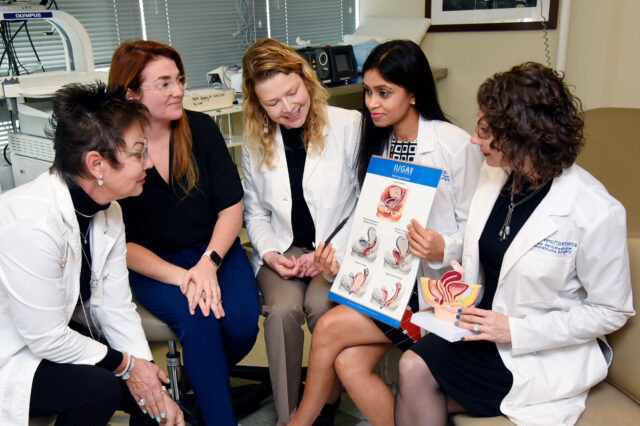Pelvic and vaginal pain

One in four women suffer from pelvic or vaginal pain. It can be felt between your navel and hips in your pelvic area or in the vaginal area. For some women, the pain is chronic and persists for six months or longer.
Pelvic pain may have multiple causes that involve different systems of the body including gynecologic, gastro-intestinal, urologic, neuro-musculoskeletal and psychosocial, and treatment often requires a multidisciplinary approach.
Pelvic/vaginal pain: Your care team
Our specialists in urogynecology and reconstructive pelvic surgery will explore potential causes of your symptoms. They will work collaboratively with other hospital specialists as needed to help you find relief.
In addition to a physical exam, our physicians may use other diagnostic tools such as blood work, urine tests, laparoscopy or a pelvic ultrasound to determine the reasons for your pain.
Pelvic/vaginal pain: Conditions we treat
Our UF Health physicians will evaluate the cause, intensity and frequency of your pain and talk with you about possible treatments. Common pelvic treatments include medications, physical therapy or surgery.
Here are examples of conditions that we can help manage:
- Vulvodynia is pain in the genital/vulvar area often described as burning, stinging irritation and rawness. Aching, soreness, throbbing and swelling also may be felt. The entire vulva may be painful, or the pain may be centered in a specific area. The pain may be constant or intermittent, and is not caused by infection, a skin condition or other medical condition. Vulvodynia is thought to be caused by inflamed nerves, muscles and tissues.
- Vaginismus is a condition in which the pelvic floor muscles involuntarily spasm around the vaginal opening and interfere with sexual intercourse or other penetration of the vagina such as the ability to insert tampons or tolerate a gynecologic exam.
- Vaginal dryness can be a problem for women at any age, although it occurs more frequently in older women, particularly after menopause. It can contribute to vaginal discomfort, pain or difficulty participating in sexual activities and also cause urinary symptoms.
- Dyspareunia is the medical term for painful intercourse that occurs just before, during or after intercourse and can be persistent or recurrent. Its causes can range from structural problems to psychological concerns. Many women have painful intercourse at some point in their lives, which can include pain only at the first sexual penetration, pain with every penetration, deep pain during thrusting or burning, aching or throbbing pain that lasts hours after intercourse.
- Pelvic floor muscle (PFM) dysfunction refers to the improper functioning of the muscle of the pelvic girdle that is responsible for supporting the pelvic organs, bladder and bowels. These muscles can be weakened due to pregnancy and delivery as well as repetitive loads such as running, heavy lifting or repeated coughing. Just like any other muscle in the body, the pelvic floor muscles can become strained causing pain and spasm, which is commonly associated with many of the above conditions. Pelvic floor disorders are best treated by pelvic floor physical therapists who have specialized training to improve muscle function and help improve your quality of life.
